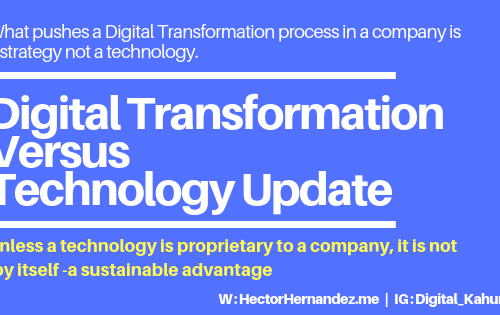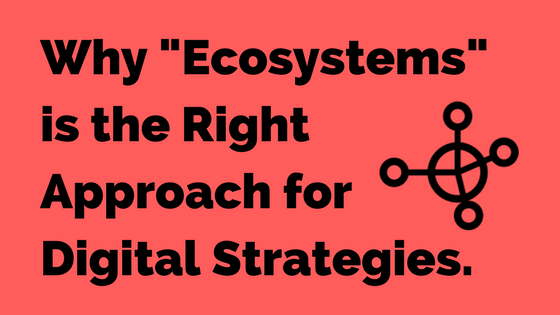Digital Transformation Versus Digital Disruption. These terms are often used interchangeably to label initiatives that would only qualify as a simple “actualizations” of systems or technology.. In other words, projects seeking -for instance – to streamline the flow of information, but without dramatically impacting the value that is delivered and perceived by the consumers.
Although digital transformation and digital disruption can be sequential and complementary processes, they are still two different types of journeys that require different levels of corporate maturity and different types of leaders.
First let’s take the term “actualization” out of the way…
When a company acquires or renews its technology to recover competitiveness or match its competitive landscape – in my opinion- that’s is an “actualization”. That is neither “transformational” nor “disruptive”.
What is Digital Transformation?
Something transformational is a radical movement that modifies both the organizational culture and the business model itself. Something that uncovers new sources of income, broadens geographic coverage, or incorporates new distribution channels.
Digital Transformation and Technology Updates are also different processes.
Not transforming on time has fatal consequences:
The entertainment industry has provided many examples as technology has been at the center of its distribution.
Starting in 1985, Blockbuster was a powerhouse in the world of rentals. At its peak in had over 8,000 stores. However, they failed to adapt to changing customer wants and with limited commercial data they closed operations in 2013.

Digital transformation begins with a data strategy
Customer experience drives Porsche’s digital strategy. Porsche has heavily invested in understanding the Porsche driver. All customer data is pulled into a central CRM data center and allocated to a unique ID. Throughout the entire lifecycle, every customer interaction at every touch point is documented.
Transformative and sustainable
Digital transformation involves defining a roadmap with a sequence of capabilities that should be developed, with the purpose of leveraging digital technology to drive efficiencies in the way data and people connect.
This transformation becomes a sustainable competitive advantage only when the components of the digital ecosystems are interconnected by design – and not by chance –leveraging cutting-edge technology and framed by culture of continuous improvement.
Now… This is the real breeding ground for disruption, because – just to emphasize – digital transformation does not imply digital disruption.
What is a digital disruption?
Disruptive is when this technology allows to re-define the value proposition of the business. It is when all that transformational effort is translated not only into operational and financial effectiveness, but also more specifically into an unprecedented benefit that the consumer receives.
Some disruptive companies:

- The world’s largest taxi company (Uber) owns no taxis
- The world’s largest accommodation provider (Airbnb) owns no real estate
- The largest communications companies (Skype, WhatsApp, Facebook Messenger, Viber) own no infrastructure
- The world’s most valuable retailer (Alibaba) has no inventory
- The most popular media platform (Facebook) creates no content
- The world’s largest movie house (Netflix) owns no cinemas
In conclusion, an organization is disruptive when they leverage the available technology in a way that changes that industry forever.
Learn how I can help you develop your Digital Marketing Plan.


